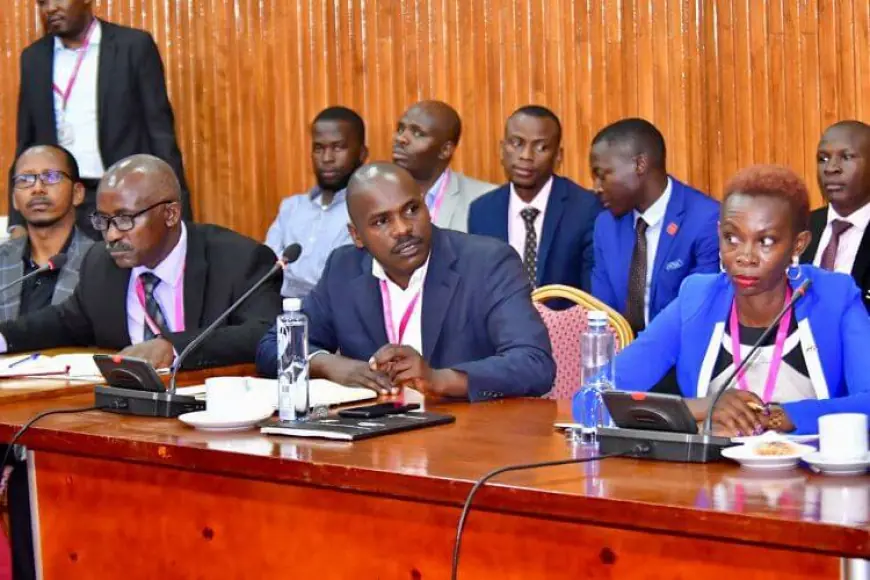Museveni's First Son Muhoozi Takes Lead in Push for Agriculture Bank

As calls for the establishment of an Agriculture and Cooperative Bank in Uganda grow louder, First Son and Chief of Defence Forces (CDF) Gen. Muhoozi Kainerugaba has stepped in to mobilize key stakeholders to make this long-awaited initiative a reality.
The revelation came through a tweet by his personal assistant, Chris Magezi, who announced that Gen. Muhoozi had taken up the matter. This move follows a formal request from Prof. Eria Hisali, the Principal of the College of Business and Management Sciences at Makerere University and an economic advisor to President Museveni. In a letter dated June 25, 2024, Prof. Hisali sought a meeting with Gen.y Muhoozi to discuss the establishment of the Agriculture and Cooperative Bank.
With Gen. Muhoozi—who also serves as a presidential advisor on special operations—now championing the initiative, many farmers and advocates of the Agriculture Bank see a renewed glimmer of hope.
A Long-Fought Battle for Farmers
The idea of creating an Agriculture and Cooperative Bank has been a long-standing demand, particularly championed by President Museveni despite reluctance from Parliament. Lt. Moses Magufuli Mugisha, who chairs the promoters of the proposed bank, has been at the forefront of this push. Magufuri has petitioned Parliament and engaged various stakeholders—including kingdoms, farmers, and cooperatives—arguing that Uganda’s banking sector is dominated by foreign-owned institutions that repatriate profits, draining the country’s economy of much-needed capital.
Economists have criticized commercial banks for being prohibitively expensive and ill-suited to the needs of farmers. Interest rates in Uganda remain alarmingly high, averaging between 18% and 23% for agricultural loans, according to the Bank of Uganda's 2023 financial report. These rates are far above the global average for agricultural financing, placing Ugandan farmers at a severe disadvantage. Moreover, commercial banks often fail to offer tailored financial products that align with agricultural cycles, leaving farmers unable to secure affordable, timely credit.
This lack of accessible financing stifles agricultural productivity, limits innovation, and forces farmers into cycles of debt. For a country where agriculture contributes approximately 24% of the GDP and employs over 70% of the population, the absence of dedicated agricultural financial support is both a missed opportunity and an economic crisis in the making.
The Cost of Foreign-Dominated Banking
Uganda’s financial sector is overwhelmingly dominated by foreign-owned banks, which control over 80% of the market share. This foreign dominance has significant implications for the economy. Profits generated by these banks are often repatriated to their parent countries, rather than being reinvested in Uganda’s economy. This capital flight undermines national economic growth, leaving local businesses, especially in agriculture, starved of resources.
The absence of indigenous banks further compounds the problem. Without homegrown financial institutions rooted in Uganda’s socio-economic context, financial services remain out of touch with the realities faced by ordinary Ugandans, particularly farmers and small business owners. Indigenous banks could prioritize local development, offer lower interest rates, and reinvest profits domestically, fostering a more resilient and self-sufficient economy.
A Step Toward Economic Reclamation?
Historically, Uganda had robust farmers’ cooperatives and marketing boards that played a pivotal role in the agricultural economy. However, these were dismantled during President Museveni’s aggressive privatization drive in the late 1980s and 1990s, which, while credited with liberalizing the economy, also handed critical sectors over to foreign interests.
The proposed Agriculture and Cooperative Bank represents more than just another financial institution—it symbolizes a potential reclamation of economic power by Ugandans. It could serve as a lifeline for farmers, providing affordable credit, fostering cooperatives, and promoting agricultural value addition.
However, critics remain skeptical. They argue that unless accompanied by robust governance frameworks and safeguards against political interference, the bank could become yet another state-run institution plagued by inefficiency and corruption.
Political Implications: Muhoozi's Calculated Move?
Beyond its economic significance, Gen. Muhoozi’s involvement in the bank’s establishment carries undeniable political weight. As speculation about his presidential ambitions continues to swirl, this initiative could be a strategic move to boost his popularity, particularly among rural farmers who form a significant voting bloc. By positioning himself as a champion of the agricultural sector, Muhoozi could consolidate support in regions that have long felt neglected by the banking system and central government.
However, many Ugandans are wary of political promises that fail to materialize. Past initiatives have often been announced with fanfare, only to fizzle out due to poor implementation or lack of political will. Whether this effort will translate into a functional institution or remain another campaign promise cloaked in patriotic rhetoric remains to be seen.
The Urgency of Action
Uganda’s agricultural sector forms the backbone of its economy, yet it remains one of the most underfunded and underdeveloped sectors. The establishment of an Agriculture and Cooperative Bank is not just an economic necessity—it is a national imperative.
With farmers struggling under exorbitant interest rates, foreign banks siphoning off profits, and political leaders using agriculture as a campaign tool, the time for tangible, farmer-centered financial reform is now. Gen. Muhoozi’s involvement has reignited hope, but whether that hope will bear fruit depends on the government’s willingness to prioritize the needs of Uganda’s farmers over political expediency.
If successful, the Agriculture and Cooperative Bank could be a transformative force, redefining the country’s agricultural landscape and reclaiming Uganda’s economic sovereignty. But if mishandled, it risks becoming yet another symbol of broken promises in a country that can ill afford more of them.












